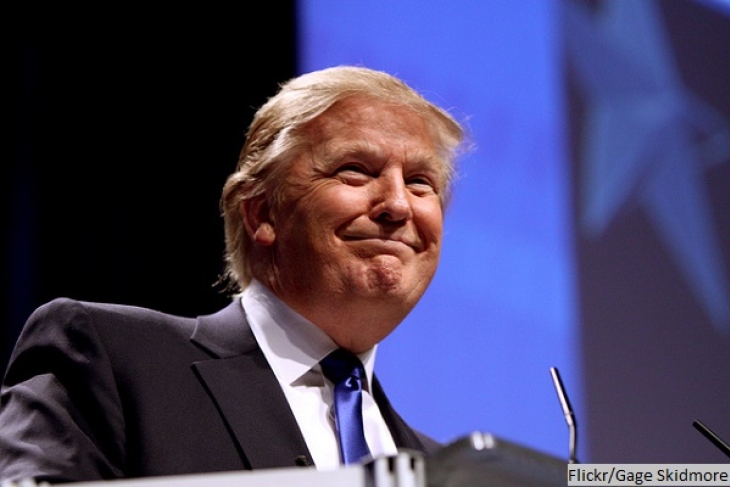Editor's note: This article was first published on June 18, 2015. It was last updated on November 23, 2016, when President-elect Donald Trump named Betsy DeVos as his pick for education secretary. Read similar posts for her and Vice President-elect Mike Pence.
President-elect Donald Trump addressed many of today’s biggest education policy issues while he was campaigning. But he’s also been talking about a number of these topics for more than a decade. For example, in The America We Deserve, published in 2000, he wrote about citizenship education, teachers unions, and school safety. And ten years later, in Think Like a Champion, he touched on American history and comprehensive education.
On Wednesday, November 23, President-elect Trump picked Betsy DeVos for U.S. Secretary of Education, a Michigan philanthropist and education activist who has chaired the state's Republican party and helped advance a number of education reforms, such as the expansion of private-school choice and the passage of Michigan’s charter school law.
In his own words, here are some of Donald Trump's thoughts on education, with recent quotes first:
1. School choice: “As president, I will establish the national goal of providing school choice to every American child living in poverty. If we can put a man on the moon, dig out the Panama Canal and win two world wars, then I have no doubt that we as a nation can provide school choice to every disadvantaged child in America.” September 2016.
2. Funding his school choice plan: "If the states collectively contribute another $110 billion of their own education budgets toward school choice on top of the $20 billion in federal dollars, that could provide $12,000 in school choice funds to every single K-12 student who today is living in poverty." September 2016.
3. Common Core: “I have been consistent in my opposition to Common Core. Get rid of Common Core.” February 2016.
4. America's schools: “We need to fix our broken education system!” February 2016.
5. Local control of education: “Keep education local!” February 2016.
6. Government's role in education: “There’s no failed policy more in need of urgent change than our government-run education monopoly." September 2016.
7. American education in an international context: “We're twenty-sixth in the world. Twenty-five countries are better than us at education. And some of them are like third world countries. But we're becoming a third world country.” June 2015.
8. Higher education loans: “A four-year degree today can be expensive enough to create six-figure debt. We can't forgive these loans, but we should take steps to help students…. There is no reason the federal government should profit from student loans.…These student loans are probably one of the only things that the government shouldn't make money from, and yet it does….Those loans should be viewed as an investment in America's future.” November 2015.
9. The U.S. Department of Education: “No, I’m not cutting services, but I’m cutting spending. But I may cut Department of Education.” October 2015.
10. Education spending: “We're number one in terms of cost per pupil by a factor of, worldwide, by a factor of many. Number two is so far behind, forget it.” January 2016.
11. American history: “I was listening to some Europeans once and they seemed to agree that Americans didn't seem to know their roots. Of course, their roots go back for many more centuries than ours and may be easier to decipher because many of us have ancestors from different countries. But it gave me a reason to think about what they said, and I realized in many cases they were right.” March 2010.
12. Comprehensive education: “Comprehensive education dissolves the lines between knowing too much and knowing too little on a variety of subjects—subjects that are necessary for success.” March 2010.
13. Citizenship education: “Public education was never meant to only teach the three R’s, history, and science. It was also meant to teach citizenship. At the lower levels it should cover the basics, help students develop study habits, and prepare those who desire higher education for the tough road ahead. It’s a mandate the public schools have delivered on since their inception. Until now.” January 2000.
14. Teachers’ unions and politics: “Our public schools have grown up in a competition-free zone, surrounded by a very high union wall. Why aren’t we shocked at the results? After all, teachers’ unions are motivated by the same desires that move the rest of us. With more than 85% of their soft-money donations going to Democrats, teachers’ unions know they can count on the politician they back to take a strong stand against school choice.” January 2000..
15. Education and antitrust: “Defenders of the status quo insist that parental choice means the end of public schools. Let’s look at the facts. Right now, nine of ten children attend public schools. If you look at public education as a business—and with nearly $300 billion spent each year on K-through-twelve education, it’s a very big business indeed—it would set off every antitrust alarm bell at the Department of Justice and the Federal Trade Commission. When teachers’ unions say even the most minuscule program allowing school choice is a mortal threat, they’re saying: If we aren’t allowed to keep 90% of the market, we can’t survive. When Bell Telephone had 90% of the market, a federal judge broke it up.” January 2000.
16. School safety and school learning: “Our schools aren’t safe, which is bad enough. On top of that, our kids aren’t learning. Too many are dropping out of school and into the street life—and too many of those who do graduate are getting diplomas that have been devalued into “certificates of attendance” by a dumbed-down curriculum that asks little of teachers and less of students. Schools are crime-ridden and they don’t teach.” January 2000.

